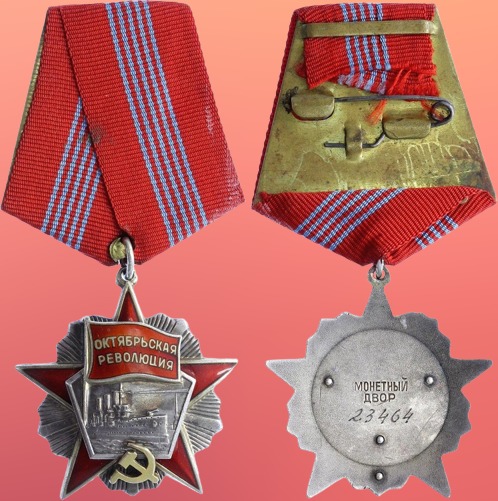Order of the October Revolution

View of the order from the front and back. Order of the October Revolution
The creation of a sketch for the Order of the October Revolution was entrusted to the artist Valentin Prokhorovich Zaitsev, who developed models for many orders and medals. All the main state symbols of that time are involved in the composition: the red banner, the hammer and sickle, the five-pointed star and the legendary cruiser Aurora.
The Order of the October Revolution was made of precious metals, the main material was silver, and the crossed sickle and hammer were cast with the addition of gold, palladium and copper. Blackening was applied on top for decoration and protection. The badge was fastened with an eyelet to a block covered with scarlet silk with light blue stripes. It should be worn on the left side.

Order of the October Revolution
Why was the Order of the October Revolution awarded?
Citizens, labor collectives, educational institutions, mass media, enterprises, cities, republics and even countries became holders of the order. The list of merits prescribed in the statute is quite extensive:
- revolutionary activity and building a socialist state;
- outstanding contribution to the development of industry, science, education and culture;
- military exploits in the fight against the enemies of the state; increasing the country’s defense capability;
- strengthening the friendship of peoples and international relations.
The Hero Cities of Russia, Leningrad and Moscow, were the first to receive the award. The fifth in the list of awardees was the cruiser Aurora, one of the few ships entitled to such a high distinction.

Cruiser Aurora
The recipients of the order include:
- Marshal Konstantin Rokossovsky;
- head of the German Communist Party Erich Honecker (Erich Ernst Paul Honecker);
- tractor driver of the collective farm “Znamya Lenina” Ivan Mozgovoy;
- the staff of the film studio “Mosfilm”;
- newspaper Komsomolskaya Pravda.

Decree on awarding the Order of the October Revolution of the city of Stavropol
It was impossible to lose the order. Although a place was provided on the reverse side for applying a duplicate sign, the award could only be re-received if it was lost during natural disasters or military operations. After the death of the recipient, the order remained in the family of the cavalier as a relic.

Ceremony of awarding the order of the newspaper Komsomolskaya Pravda




